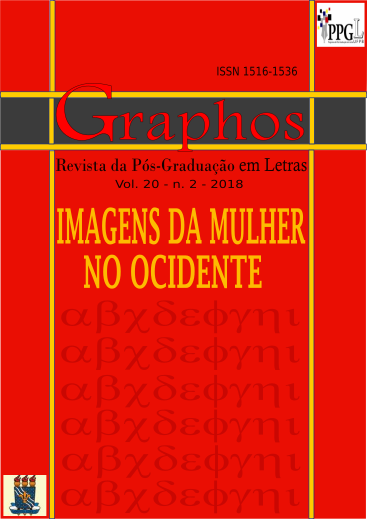The woman in the satyrical tradition in the medieval latin and the misoginy in Andrew the chaplain’s De amore
Keywords:
Medieval literature, Latin satire, Misogyny, Andrew the Chaplain, De amoreAbstract
In the context of the apogee of the literary phenomenon known in the medieval world as the art of courtly love, peculiar due to its complex ideals of idealization of feminine love, a virulent mode of critical writing of women is found, either in poetic form, or even mixing them both. Modulating the canon of ancient criticism against the feminine gender, this type of misogynist writing was responsible for the appearance and updating of a mode of satirical literature composed in the Latin of the XI and XII centuries, strongly committed to the ideals of traditional misogyny. It is in the wake of this type of misogynistic satirical literature written in medieval Latin that the present article aims to analyze, in a critically-theoretical and comparative way the controversial, because ambiguous in its intentions, De amore, a treatise written about 1185 by André the Chaplain or André Chaplain (Andreas Capellanus). The article intends to show that the misogynistic disposition of Chaplain constitutes a satirical literary form of the time combined with the cultured idealism of courtly love. But at the same time, it expresses the idea of a strategic confrontation of misogynist politics of stabilizing the female figure as a perfect paradoxical equilibrium insofar as it serves at the same time for the defamation and praise offered to male prerogatives.
Downloads
References
CAPELLANUS, Andreas. De amore libri tres. Disponível em: http://www.thelatinlibrary.com/capellanus.html Acesso em: 07 jun. 2018.
_____. Andreas Capellanus on love. Ed. e trad. P. G. Walsh. London: Duckworth, 1982.
BLOCH, R. Howard. Misoginia medieval e a invenção do amor romântico ocidental. Trad. Claudia Moraes. Rio de Janeiro: Editora 34, p. 180-206.
HOLY BIBLE. Tradução da vulgata latina. Belfast, ed. de 1852.
ISIDORE OF SEVILLE, St. Isidori hispalensis episcopi: etymologiarum sive originum libri xx. Ed. W. M. Lindsay, 2 v. Oxford: Clarendon Press, 1962.
JACQUART, Danielle; THOMASSET, Claude. Sexuality and medicine in the middle ages. Trad. M. Adamson. Cambridge: Polity Press, 1988.
JEROME, St. Letter 22, to Eustochium. In: _______. The principal works of St Jerome. Ed. P. Schaff e trad. W. H. Fremantle. Christian Classics Ethereal Library, Nicene and Post-Nicene Fathers, series II, v. 6. Grand Rapids, Michigan: WM. B. Berdmans Publishing Company, 1892, p. 100-137. Disponível em: http://www.ccel.org/ccel/schaff/npnf206.pdf Acesso em: 07 jun. 2018.
______. Letter 77, to Oceanus. In: _______. The principal works of St Jerome. Ed. P. Schaff e trad. W. H. Fremantle. Christian Classics Ethereal Library, Nicene and Post-Nicene Fathers, series II, v. 6. Grand Rapids, Michigan: WM. B. Berdmans Publishing Company, 1892, p. 391-402. Disponível em: http://www.ccel.org/ccel/schaff/npnf206.pdf Acesso em: 07 jun. 2018.
______. Against Jovinian. In: ______. The principal works of St Jerome. Ed. P. Schaff e trad. W. H. Fremantle. Christian Classics Ethereal Library, Nicene and Post-Nicene Fathers, series II, v. 6. Grand Rapids, Michigan: WM. B. Berdmans Publishing Company, 1892, p. 779-907. Disponível em: http://www.ccel.org/ccel/schaff/npnf206.pdf Acesso em: 07 jun. 2018.
JUVENAL. Satire VI. In: _____. The satires of Juvenal. Trad. R. Humphries. Bloomington: Indiana University Press, 1958.
MARBODUS REDONENSIS EPISCOPUS. De meretrice. In: MIGNE, Jacques-Paul. Patrologiae cursus completus, Liber decem capitulorum. Series latina. Paris: 1844-1890, 171, cols. 1698-1699. Disponível em: http://www.documentacatholicaomnia.eu/02m/10351123,_Marbodus_Redonensis_Episcopus,_Liber_Decem_Capitulorum,_MLT.pdf Acesso em: 07 jun. 2018.
MAP, Walter. The letter of Valerius to Ruffinus, against marriage .(Dissuasio Valerii ad Ruffinum philosophum nec uxorem ducat). In: ______. De nugis curialium, courtiers’ trifles. Ed. e trad. M. R. James, rev. C.N.L. Brooke and R. A. B. Mynors. Oxford: Clarendon Press, 1983. p. 287-331.
OVID. Amores. In: ______. Ovid: the erotic poems. Trad. P. Green. Harmondsworth: Penguin, 1982.
______. Ars amatoria. In: ______. Ovid: the erotic poems. Trad. P. Green. Harmondsworth: Penguin, 1982.
______. Heroides, amores; art of love, cosmetics, remedies for love, ibis, walnut-tree, sea fishing, consolation; metamorphoses; fasti; tristia, ex ponto. Goold, G.P., et alii (eds.), vols. I-VI. Loeb Classical Library. Cambridge, Mass. / London: HUP, 1977-1989.
_______. The cures for love (remedia amoris). Trad. A. S. Kline, 2001. Disponível em: http://www.poetryintranslation.com/PITBR/Latin/CuresforLove.php. Acesso em: 07 jun. 2018.
VIRGÍLIO. Eneida. Trad. José Victorino Barreto Feio e José Maria da Costa e Silva. São Paulo: Martins Fontes, 2004.
WALTHER, Hans. Proverbia sententiaeque latinitatis medii aevi. 9 vols. Göttingen: Vandenhoeck and Ruprecht, 1963-1969.







